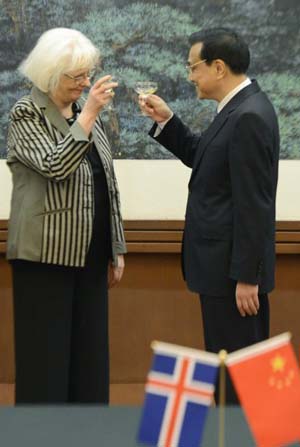How China became an 'Arctic State'
- By Mikå Mered
 0 Comment(s)
0 Comment(s) Print
Print E-mail Beijing Review, May 20, 2013
E-mail Beijing Review, May 20, 2013
 |
|
Chinese Premier Li Keqiang (R) toasts with his Icelandic counterpart Prime Minister Johanna Sigurdardottir after sealing the free-trade agreement (FTA) between China and Iceland on April 15 in Beijing. |
Icelandic Prime Minister Johanna Sigurdardottir and her counterpart Li Keqiang sealed on April 15 in Beijing the first free-trade agreement (FTA) between China and a European state. In Iceland, China can expect better access to North Atlantic waters thanks to the development of the Arctic Bridge sea route, and the development of deep-water shipping hubs in Akureyri, Seydisfjördur, Hvalfjördur or Reykjavík.
China can also expect direct access to cutting-edge Icelandic clean tidal, geothermal and hydrogen energy generation technologies in the short to medium run. Massively financing and importing Icelandic clean technology will reduce China's dependence on fossil energies and revive the Icelandic economy to higher levels than during the almighty deregulated finance era that preceded the global financial crisis in October 2008. Indeed, Iceland can expect China to fuel its post-crisis growth by being its main outlet for clean technology exports and largest foreign direct investment provider in R&D and infrastructure. Also, the return of the Progressive Party (center-right, agrarian) and Independent Party (conservative) in power will not harm this new era of Iceland-China relations. Despite their strong isolationist and somewhat demagogic campaigning, the promise of better growth rates that got them the majority of parliamentary seats on April 27 can only be obtained thanks to the infrastructure and clean technology sectors that China will support.
Highly beneficial to both countries on economic grounds, this FTA is a model of the liberal bilateral trust-building approach China can now adapt and apply to other Arctic partners to increase its influence across the region. In other words, the basic geoeconomics logic is simple: If one wants to channel China's ever-growing influence vis-à-vis Arctic states, China must then be included in Arctic governing bodies like the Arctic Council.
Furthermore, in addition to economic gains, there is also a symbolic factor to cooperation that fostered trust-building in record time: China and Iceland are at different levels of Arctic integration, but both seek the same kind of inclusive gains. Indeed, despite being a direct Arctic stakeholder, Iceland's slightly sub-Arctic geographical location has prevented it from being part of the "Arctic-5" league. Comprised of the five Arctic circumpolar states, the "Arctic-5" hold informal ministerial and thematic meetings outside the Arctic Council framework to the great detriment of sub-Arctic Iceland.
Therefore, Iceland must gain influence at the regional and global level to force the "Arctic-5" countries to recognize it as the last natural member of the club; and likewise, while being increasingly involved in the Arctic via massive economic investments and increasing research activities, China remains a near-Arctic state that yet awaits formal recognition from the Arctic-8 states club. In this regard, China's relationship with Iceland confers the latter with a new international status.
Finally, Icelandic President Olafur Grimssón has offered a great gift to China by creating the Arctic Circle Forum (ACF). Sort of a Davos-like forum on Arctic affairs, the ACF will host Chatham House-ruled meetings with virtually any potential Arctic stakeholder, from non-Arctic states to private companies, as well as academic researchers and activists.
Therefore, the ACF will rapidly be both Iceland's and China's most useful Track II diplomatic weapon to gain greater influence with a variety of Arctic stakeholders.
From this perspective, again, if one wants to channel China's ever-growing influence vis-à-vis Arctic states by crushing the development of new more inclusive international venues where China could meet and greet with its Arctic neighbors, then the best solution is to strengthen existing regular Arctic governing bodies like the Arctic Council by letting China in.
Overall, the China-Iceland relationship—both politically and strategically—has a special place among relations between China and Arctic rural states, let alone Western countries. It showed everyone that because China has the means to build this kind of fruitful bilateral relationship with any other Arctic and near-Arctic state, China doesn't need to abide by the Arctic states' self-interested rules and agenda to ultimately lend influence to the future of Arctic governance. Ultimately, that is what got China in the Arctic Council.






Go to Forum >>0 Comment(s)